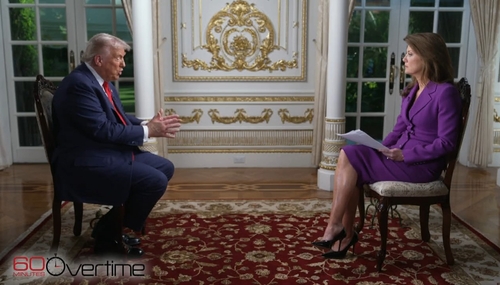Continuing its Extraordinary Earth series pushing the climate change agenda, on Tuesday, ABC’s Good Morning America aired a juvenile report portraying efforts to reduce one’s carbon footprint as a daily struggle between good and evil. The segment urged viewers to listen to their “better angels” on the environment and ignore their “devilish instincts.”
“Reducing our carbon footprint means changing our habits, but change is hard. Sometimes we listen to our better angels, but other times our devilish instincts have us taking the easy path,” warned correspondent Becky Worley, as angel and devil versions of herself appeared on screen, hovering above each shoulder (yes, really).
Luckily, the reporter found a way to guide her climate conscience: “That’s where the EPA’s carbon calculator comes in. It adds up all our little choices to help us see the amount of carbon we personally put into the atmosphere.”
Worley was then confronted with a series of scenarios that truly tested her environmental faith:
Take recycling. The devil says, “Don’t rinse that out. Just toss it.” Make that choice all the time and, boom, the average person helps create 692 pounds of carbon annually.
Now let's talk gas and electricity. The devil says, “Turn the thermostat up, wash on hot, leave your computer on all night.” But using the EPA calculator, our angel advises setting up power management to turn your computer off automatically, a cold wash, “It cleans just as well,” and lowering the house temperature a few degrees. “That sweater is just fetching on you,” thank you. To save 9,115 pounds of CO2 each year, not to mention over $70 a month in utility bills.
And of course, driving. “You’re too tired to bike to work. Public transport, oh, no. Too much human interaction [coughing].” But when our angel uses the carbon calculator to guide our choices – wait, angels do math? “Of course, we do.” Reducing your driving even 10% below average can reduce your carbon footprint by over 1,100 pounds of CO2.
Wrapping up the report, she proclaimed: “Here’s to our better angels moving us toward a better future.”
On Monday, reporter Will Reeve panicked over the possibility that climate change could cripple the coffee industry.
When launching the climate series back on February 19, ABC’s chief meteorologist Ginger Zee traveled to Africa and scolded the U.S. for being one of “the biggest carbon emitters.”
As Christians around the world observe Lent in preparation for Easter, it’s clear some in the liberal media are following a different religion.
Here is a full transcript of the March 3 report:
8:30 AM ET
ROBIN ROBERTS: In our Extraordinary Earth series we saw how the threat of a changing climate is endangering animals like sea turtles. Well, this morning, we’re showing you how small changes you can make, can make a big difference for the planet. Becky Worley has a look at how our daily routines may be leaving a bigger carbon footprint than we think.
[ON-SCREEN HEADLINE: Shrinking Your Carbon Footprint; What You Can Do to Help Our Extraordinary Earth]
BECKY WORLEY: Reducing our carbon footprint means changing our habits, but change is hard. Sometimes we listen to our better angels, but other times our devilish instincts have us taking the easy path. That’s where the EPA’s carbon calculator comes in. It adds up all our little choices to help us see the amount of carbon we personally put into the atmosphere.
Take recycling. The devil says, “Don’t rinse that out. Just toss it.” Make that choice all the time and, boom, the average person helps create 692 pounds of carbon annually.
Now let's talk gas and electricity. The devil says, “Turn the thermostat up, wash on hot, leave your computer on all night.” But using the EPA calculator, our angel advises setting up power management to turn your computer off automatically, a cold wash, “It cleans just as well,” and lowering the house temperature a few degrees. “That sweater is just fetching on you,” thank you.
To save 9,115 pounds of CO2 each year, not to mention over $70 a month in utility bills.And of course, driving. “You’re too tired to bike to work. Public transport, oh, no. Too much human interaction [coughing].” But when our angel uses the carbon calculator to guide our choices – wait, angels do math? “Of course, we do.” Reducing your driving even 10% below average can reduce your carbon footprint by over 1,100 pounds of CO2.
Here’s to our better angels moving us toward a better future.
When we add up the CO2 saved by those little angelic changes, it’s a 19% reduction in CO2. It’s over 4,000 pounds in carbon emissions saved. It’s like planting two and a half acres of trees, to throw another number at you. That calculator has really motivated me. My habits make a difference, guys.
GEORGE STEPHANOPOULOS: That’s a good idea. Really, really good idea. [Applause and cheers] Thank you, Becky.
ROBERTS: And the Oscar goes to – that was great.




